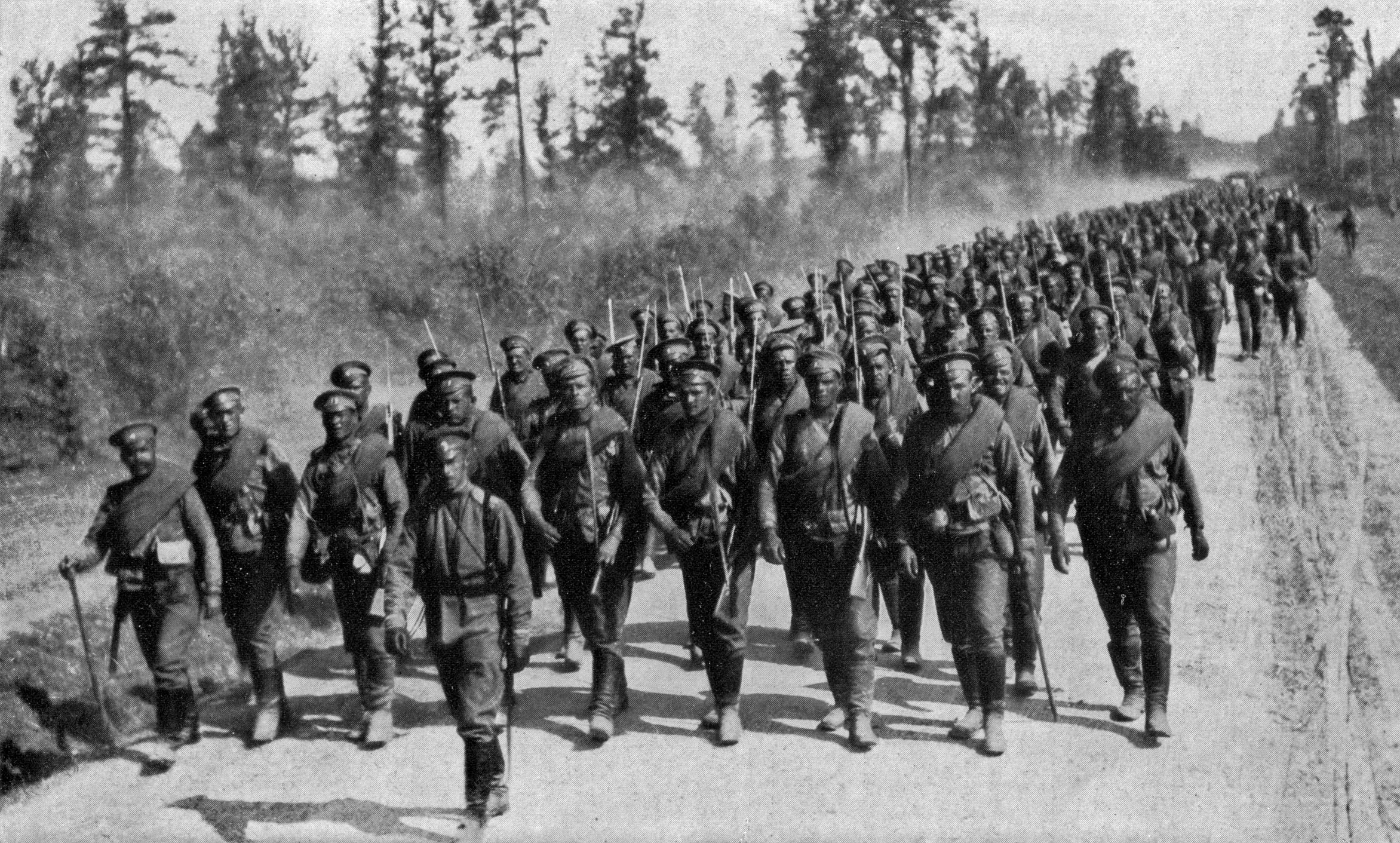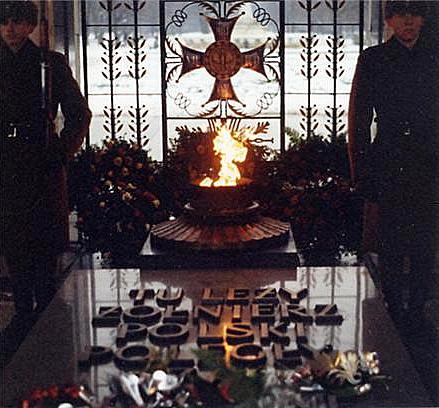|
Battle Of Mołotków
The Battle of Mołotków (Polish: Bitwa pod Mołotkowem) took place on October 29, 1914, near the village of Mołotków (Molotkiv), Austrian Galicia (Eastern Europe), Galicia (current Ukraine). 2nd Brigade, Polish Legions, 2nd and 3rd Brigade, Polish Legions, 3rd Infantry Regiments of Polish Legions in World War I, Polish Legions clashed with units of the Russian Imperial Army, which had invaded Galicia (see Russian occupation of Eastern Galicia, 1914–15). Polish forces were part of Tactical Group of General Karol Durski-Trzaska. On October 29, the Group of Durski-Trzaska attacked Russian positions in the outskirts of Mołotków. Polish 4th Battalion commanded by Bolesław Roja managed to reach the center of the village, but was then stopped and forced to retreat. Meanwhile, the bulk of both 2nd and 3rd Regiments, with some 6000 soldiers, fiercely resisted 12 battalions of Russian infantry (15 000) soldiers, supported by 24 machine guns and 16 cannons. The Russians broke through ... [...More Info...] [...Related Items...] OR: [Wikipedia] [Google] [Baidu] |
Eastern Front (World War I)
The Eastern Front or Eastern Theater, of World War I, was a theater (warfare), theater of operations that encompassed at its greatest extent the entire frontier between Russian Empire, Russia and Kingdom of Romania, Romania on one side and Austria-Hungary, Kingdom of Bulgaria, Bulgaria, the Ottoman Empire, and German Empire, Germany on the other. It ranged from the Baltic Sea in the north to the Black Sea in the south, involved most of Eastern Europe, and stretched deep into Central Europe. The term contrasts with the Western Front (World War I), Western Front, which was being fought in Belgium and French Third Republic, France. Unlike the static warfare on the Western Front, the fighting on the geographically larger Eastern Front was maneuver warfare, more dynamic, often involving the flanking and encirclement of entire formations, and resulted in over 100,000 square miles of territory becoming occupied by a foreign power. At the start of the war Russia launched offensives agai ... [...More Info...] [...Related Items...] OR: [Wikipedia] [Google] [Baidu] |
Galicia (Eastern Europe)
Galicia ( ;"Galicia" ''Collins English Dictionary'' also known by the Variant name (geography), variant name Galizia; , ; , ; ; see #Origins and variations of the name, below) is a historical and geographic region spanning what is now southeastern Poland and western Ukraine, long part of the Polish–Lithuanian Commonwealth.See also: It covers much of the other historic regions of Red Ruthenia (centered on Lviv) and Lesser Poland (centered on Kraków). The name of the region derives from the medieval city of Halych, and was first mentioned in Hungarian historical chronicles in the year 1206 as ''Galiciæ''. The eastern part of the region was c ... [...More Info...] [...Related Items...] OR: [Wikipedia] [Google] [Baidu] |
1914 In Ukraine
This year saw the beginning of what became known as the First World War, after Archduke Franz Ferdinand of Austria, heir to the Austrian throne was Assassination of Archduke Franz Ferdinand, assassinated by Serbian nationalist Gavrilo Princip. It also saw the first airline to provide scheduled regular commercial passenger services with heavier-than-air aircraft, with the St. Petersburg–Tampa Airboat Line. Events January * January 1 – The St. Petersburg–Tampa Airboat Line in the United States starts services between St. Petersburg, Florida, St. Petersburg and Tampa, Florida, becoming the first airline to provide scheduled regular commercial passenger services with heavier-than-air aircraft, with Tony Jannus (the first federally-licensed pilot) conveying passengers in a Benoist XIV flying boat. Abram C. Pheil, mayor of St. Petersburg, is the first airline passenger, and over 3,000 people witness the first departure. * January 11 **The Sakurajima volcano in Japan ... [...More Info...] [...Related Items...] OR: [Wikipedia] [Google] [Baidu] |
Conflicts In 1914
Conflict may refer to: Social sciences * Conflict (process), the general pattern of groups dealing with disparate ideas * Conflict continuum from cooperation (low intensity), to contest, to higher intensity (violence and war) * Conflict of interest, involvement in multiple interests which could possibly corrupt the motivation or decision-making * Cultural conflict, a type of conflict that occurs when different cultural values and beliefs clash * Ethnic conflict, a conflict between two or more contending ethnic groups * Group conflict, conflict between groups * Intragroup conflict, conflict within groups * Organizational conflict, discord caused by opposition of needs, values, and interests between people working together * Role conflict, incompatible demands placed upon a person such that compliance with both would be difficult * Social conflict, the struggle for agency or power in something * Work–family conflict, incompatible demands between the work and family roles of ... [...More Info...] [...Related Items...] OR: [Wikipedia] [Google] [Baidu] |
Battles Involving The Russian Empire
A battle is an occurrence of combat in warfare between opposing military units of any number or size. A war usually consists of multiple battles. In general, a battle is a military engagement that is well defined in duration, area, and force commitment. An engagement with only limited commitment between the forces and without decisive results is sometimes called a skirmish. The word "battle" can also be used infrequently to refer to an entire operational campaign, although this usage greatly diverges from its conventional or customary meaning. Generally, the word "battle" is used for such campaigns if referring to a protracted combat encounter in which either one or both of the combatants had the same methods, resources, and strategic objectives throughout the encounter. Some prominent examples of this would be the Battle of the Atlantic, Battle of Britain, and the Battle of France, all in World War II. Wars and military campaigns are guided by military strategy, whereas batt ... [...More Info...] [...Related Items...] OR: [Wikipedia] [Google] [Baidu] |
Battles Of World War I
This list of military engagements of World War I covers terrestrial, maritime, and aerial conflicts, including campaigns, operations, defensive positions, and sieges. Campaigns generally refer to broader strategic operations conducted over a large bit of territory and over a long period of time. Battles generally refer to short periods of intense combat localized to a specific area and over a specific period of time. However, use of the terms in naming such events is not consistent. For example, the First Battle of the Atlantic was more or less an entire theatre of war, and the so-called battle lasted for the duration of the entire war. European theatre (1914–1918) Western Front (1914–1918) The Western Front comprised the fractious borders between France, Germany, and the neighboring countries. It was infamous for the nature of the fight that developed there; after almost a full year of inconclusive fighting, the front had become a giant trench line stretching from o ... [...More Info...] [...Related Items...] OR: [Wikipedia] [Google] [Baidu] |
Communism
Communism () is a political sociology, sociopolitical, political philosophy, philosophical, and economic ideology, economic ideology within the history of socialism, socialist movement, whose goal is the creation of a communist society, a socioeconomic order centered on common ownership of the means of production, distribution, and exchange that allocates products in society based on need.: "One widespread distinction was that socialism socialised production only while communism socialised production and consumption." A communist society entails the absence of private property and social classes, and ultimately money and the State (polity), state. Communists often seek a voluntary state of self-governance but disagree on the means to this end. This reflects a distinction between a Libertarian socialism, libertarian socialist approach of communization, revolutionary spontaneity, and workers' self-management, and an authoritarian socialism, authoritarian socialist, vanguardis ... [...More Info...] [...Related Items...] OR: [Wikipedia] [Google] [Baidu] |
Tomb Of The Unknown Soldier (Warsaw)
The Tomb of the Unknown Soldier () is a monument in Warsaw, Poland, dedicated to the unknown soldiers who have given their lives for Poland. It is one of many such national tombs of unknowns that were erected after World War I, and the most important such monument in Poland. The monument, located at Piłsudski Square, is the only surviving part of the Saxon Palace that occupied the spot until World War II. Since 2 November 1925 the tomb houses the unidentified body of a young soldier who fell during the Defence of Lwów. Since then, earth from numerous battlefields where Polish soldiers have fought has been added to the urns housed in the surviving pillars of the Saxon Palace. The Tomb is constantly lit by an eternal flame and assisted by a guard post provided by the three companies of the 1st Guards Battalion, Representative Regiment of the Polish Armed Forces. It is there that most official military commemorations take place in Poland and where foreign representatives lay ... [...More Info...] [...Related Items...] OR: [Wikipedia] [Google] [Baidu] |
Walki II Brygady Legionów Polskich W Karpatach, Transport Rannych
Walki may refer to: Places * Walki, Belgaum, Karnataka, India; a village * Walki, Ahmednagar, Maharashtra, India; a village * Wałki, Jodłówka-Wałki, Tarnow, Tarnow, Lesser Poland, Poland; a district * Walki, Tuge, Musawa, Katsina, Nigeria; a village, see List of villages in Katsina State Other uses * Walki language, an Australian Aboriginal language See also * Walkis Magic Academy, a fictional location in the Japanese comic manga ''Mashle'' * Konfrontacja Sztuk Walki (KSW), a Polish martial art * * Walkey * Walk (other) A walk is walking, the main form for animal locomotion on land, distinguished from running and crawling. Walk or WALK may refer to: Places *Walk, Livonia, the German name for a town in Livonia *Island Walk, an unincorporated area and a census-des ... * Walke (other) * Walkie (other) {{Dab ... [...More Info...] [...Related Items...] OR: [Wikipedia] [Google] [Baidu] |
Russian Occupation Of Eastern Galicia, 1914–15
Russian(s) may refer to: *Russians (), an ethnic group of the East Slavic peoples, primarily living in Russia and neighboring countries *A citizen of Russia *Russian language, the most widely spoken of the Slavic languages *''The Russians'', a book by Hedrick Smith *Russian (comics), fictional Marvel Comics supervillain from ''The Punisher'' series *Russian (solitaire), a card game * "Russians" (song), from the album ''The Dream of the Blue Turtles'' by Sting *"Russian", from the album ''Tubular Bells 2003'' by Mike Oldfield *"Russian", from the album '' '' by Caravan Palace *Nik Russian, the perpetrator of a con committed in 2002 See also * *Russia (other) *Rus (other) *Rossiysky (other) Rossiysky (masculine), Rossiyskaya (feminine), or Rossiyskoye (neuter), all meaning ''Russian Federation, Russian'', may refer to: *Rossiysky, Orenburg Oblast, a rural locality (a settlement) in Orenburg Oblast, Russia *Rossiysky, Rostov Oblast, a r ... * Russian River ... [...More Info...] [...Related Items...] OR: [Wikipedia] [Google] [Baidu] |



